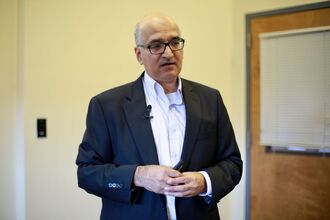|
When was the last time you asked this question? You probably have never asked if you are like me, let alone even thought about asking this question. But how would you answer this question if you are asked at the final stage of your job interview? The answer could determine whether you get the job or not. I think it's a great question that will tell a lot about how you think, act, and excel in your profession. After reading the modern classic "Remains of the Day'' by Kazuo Ishiguro, I started thinking about this question. In the book, James Stevens, a butler, asks, "what makes a great butler?" He gives a lot of thought to this question as he is traveling in England's countryside. He comes up with two attributes of a great butler: dignity and attachment to a distinguished household. Dignity By this, Stevens means a butler gets the job done for his employer without anyone even knowing it. There are other attributes, such as competence, that are important, but it's dignity that stands above all for being a great butler. Stevens believes one could develop dignity through hard work, experience and self-learning. Stevens gives three examples of what he means by dignity in a great butler. I will use two of the examples in this post. The first one is a story Stevens heard from his father, who was also a butler. Stevens considered his father to be a great butler. The story is about a butler who had traveled with his employer to India and the incident that showed the butler's dignity in handling a dangerous situation. One afternoon the butler entered a dining room and saw a tiger relaxing below the dining table. The butler calmly approached his employer in a drawing-room (today it would be called a living room) where he was having tea with his guests. The butler let out a polite cough to get his employer's attention and whispered in his ear that there was a tiger in the dining room. He asked for his permission to use a shot-gun to take care of the situation. Soon, three shots were heard. A few minutes later, the butler appeared in the drawing-room to refill the teapot. When the employer asked if everything was fine, the butler replied, "'Perfectly fine, thank you, sir...Dinner will be served at the usual time, and I am pleased to say there will be no discernible traces left of the recent occurrence by that time." Stevens mentions that his father always laughed when he would repeat when butler added "no discernible traces left of the recent occurrence by that time." He was laughing since the butler is saying to his employer you don't need to explain anything to your guests since there is no evidence of anything occurring. The butler in the story did not panic. He got the job done and, most importantly, maintained his and his employer's dignity by not having the employer's guests get frightened and ruining their pleasant visit. The other incident of dignity involved Steven's father when he was a butler. This story was relayed to Stevens by someone named Mr. Charles, who was present when it occurred. One day Mr. Charles and two of the guests of an employer got in a car to be driven around by Stevens' father. The guests were drunk and got rowdy. They started criticizing Stevens' father for what they perceived was his driving mistake. They also started criticizing Stevens' father's employer. That was the breaking point for Stevens' father. He stopped the car, opened the back door, and just stood there showing his displeasure at the two guests. The guests had no idea what Stevens' father was going to do next. He just stood there with the door opened. Soon the two guests realized that they were at fault, and one of them muttered. "I suppose we were talking a little out of turn there. It won't happen again." Stevens' father gently closed the door and continued his driving as if nothing happened. Stevens shows that his father did not lose control, confront the guests, or return home immediately. He calmly handled a difficult situation with dignity. No one got hurt, and the employer didn't have to know what happened. Everyone's dignity was preserved. Attachment to a distinguished household The second trait to being a great butler is belonging to a distinguished household working for a renowned man. The reason for this is, as Stevens explains, that movers and shakers of the political and business world meet at such mansions where big decisions are made. A butler's job is to make sure everything goes smoothly. The great butler makes sure that the employer looks good and plays his part in solving big problems. As Stevens gives more thought to this, he says, "association with a truly distinguished household is a prerequisite of 'greatness.' A 'great' butler can only be, surely, one who can point to his years of service and say that he has applied his talents to serving a great gentleman – and through the latter, to serving humanity." What makes one a great public speaker? I am a public speaker, so I thought about this question like James Stevens. I believe a person is considered a great public speaker if he or she achieves the following: 1) moves people to action 2) speaks the truth 3) takes personal risks 4) changes the world in a positive way 5) becomes immortal through his or her speeches Based on these criteria, the list gets very narrow, and we're left with Socrates, Jesus, Lincoln, Gandhi, JFK, MLK, and Malcolm X. The negative side of being great at your profession There is also a negative side to being obsessed with being great at your profession. To learn more on how this obsession ends up hurting James Stevens, I encourage you to read my blog post titled, "Being great at your profession creates blind spots." #####  I am an author, speaker, career success coach. I guide people thrive on high stakes stage whether it's for a job interview, career advancement, a sales presentation or a high-stakes speech. I am the author of a practical book on speaking titled Winning Speech Moments: How to Achieve Your Objective with Anyone, Anytime, Anywhere. The main idea of the book is that if you want people to remember your speech and take action, you must create a winning speech moment. Please download the free speech checklist I created that I always use to create a winning speech for any occasion. Please contact me if you would like to thrive on high stakes stage. You can reach me at [email protected] or 732-847-9877. Note, if you are an author, executive, podcaster or interesting and would like me to interview with five questions and then publish it as a blog post and promote it on LinkedIn, Twitter and Facebook and become famous, please contact me.
0 Comments
Leave a Reply. |
AuthorJay Oza Archives
July 2024
Categories
All
|
© 2017 Winning Speech Moments


 RSS Feed
RSS Feed